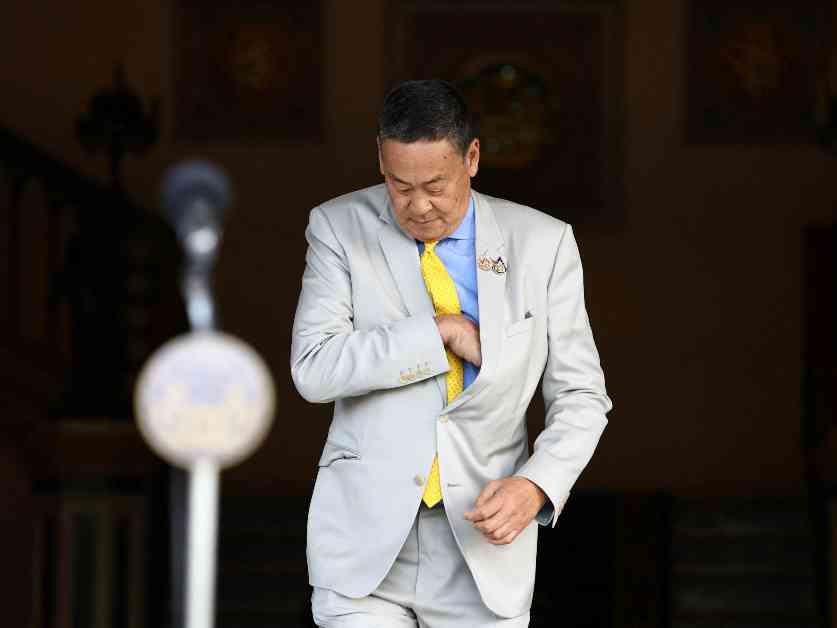Thailand’s Political Turmoil: Prime Minister Removed, What’s Next?
Thailand is once again engulfed in political turmoil following the removal of Prime Minister Srettha Thavisin from office by a court ruling after less than a year in power. The decision by the constitutional court to dismiss Srettha of the Pheu Thai Party has left the country reeling and uncertain about its political future.
Reasons for Removal
The court’s ruling to remove Srettha stemmed from allegations of unethical conduct and breach of integrity. Judge Punya Udchachon, delivering the verdict, stated that Srettha had shown “no honesty” and had violated ethical standards by appointing a minister with a criminal conviction to his cabinet. Former lawyer Pichit Chuenban, who had a history of attempting to bribe court officials, was appointed by Srettha in a cabinet reshuffle, leading to his own downfall.
Impact of the Decision
Srettha’s dismissal makes him the fourth prime minister in Thailand to be removed by the constitutional court in the last 16 years. The unexpected nature of the ruling has left many in the country surprised and unprepared for the consequences. Khemthong Tonsakulrungruang, a political science lecturer at Chulalongkorn University, expressed shock at the verdict, stating that the accusation against Srettha was seen as trivial by most people.
Potential Successors
With Srettha’s removal, the Pheu Thai Party is now scrambling to nominate a replacement candidate for the prime ministerial position. The Thai parliament is set to convene a special session to vote on the issue, with former Justice Minister Chaikasem Nitisiri and party leader Paetongtarn Shinawatra emerging as top contenders for the role. The decision on Srettha’s successor will have far-reaching implications for the country’s political landscape.
Party Maneuvers
The removal of Srettha follows another significant ruling by the constitutional court, which dissolved the Move Forward Party for proposing reforms to the monarchy-related Section 112 of Thailand’s Criminal Code. The court’s actions have raised concerns about the influence of the military and ruling elite in Thai politics, with pro-democracy parties facing challenges in forming coalitions and gaining power.
Challenges Ahead
As Thailand navigates its political turmoil, the country faces challenges in ensuring stability and democratic governance. The court’s decisions have highlighted the fragility of political office in Thailand and the influence of external forces in shaping the country’s leadership. Moving forward, it will be crucial for Thai politicians to prioritize transparency, accountability, and ethical conduct in their roles to rebuild public trust and confidence in the political system.
Internal Politics and Power Struggles
The recent political developments in Thailand have exposed underlying power struggles and internal politics within the ruling elite. The influence of figures like former Prime Minister Thaksin Shinawatra has been a key factor in shaping political decisions and alliances. Thaksin’s legal troubles and the implications for his family members have added a layer of complexity to the country’s political landscape.
Thaksin’s Legacy
Thaksin Shinawatra, a polarizing figure in Thai politics, continues to loom large over the country’s leadership dynamics. His influence, despite years of exile and legal battles, remains a significant force in shaping political alliances and decisions. The challenges faced by the Pheu Thai Party in navigating Thaksin’s legal issues reflect the delicate balance of power in Thailand’s political scene.
Constitutional Reforms and Democratic Values
The recent court rulings and political upheaval in Thailand have raised questions about the country’s commitment to democratic values and constitutional reforms. The dissolution of political parties and the removal of elected officials through judicial intervention have sparked concerns about the integrity of the political process and the protection of civil liberties.
Calls for Reform
Civil society groups and pro-democracy activists in Thailand have called for constitutional reforms to safeguard democratic principles and ensure accountability in government. The need for a transparent and fair political system that upholds the rule of law is paramount in rebuilding public trust and confidence in Thailand’s institutions. The role of the judiciary in upholding democratic values and protecting citizens’ rights will be essential in shaping the country’s future trajectory.
International Relations and Regional Impact
Thailand’s political turmoil has not gone unnoticed on the international stage, with implications for regional stability and diplomatic relations. The country’s internal struggles and leadership transitions can have ripple effects on neighboring countries and global partners, impacting trade, security, and cooperation in the region.
Regional Dynamics
As a key player in Southeast Asia, Thailand’s political developments can influence regional dynamics and alliances. The uncertainty surrounding the country’s leadership and governance can create challenges for regional cooperation and stability. Maintaining strong diplomatic relations and engaging in dialogue with international partners will be crucial for Thailand to navigate its political challenges effectively.
Conclusion
Thailand’s political turmoil following the removal of Prime Minister Srettha Thavisin highlights the complex dynamics of power, influence, and governance in the country. The court’s decisions, internal power struggles, and calls for constitutional reforms underscore the need for transparency, accountability, and democratic values in Thailand’s political system. As the country navigates its uncertain political future, it will be essential for leaders to prioritize the interests of the people, uphold the rule of law, and work towards building a more inclusive and democratic society for all.



























